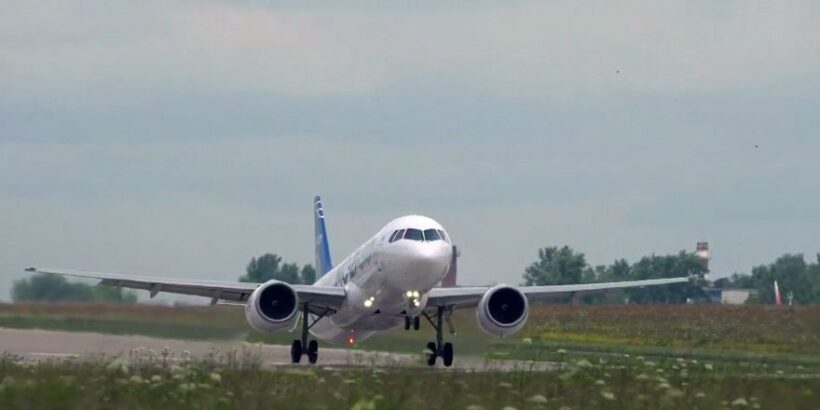Test aircraft MC-21 tail number 73055 conducted its first flight under the supplemental certification testing program on June 26, 2025, at Ramenskoye Airport of the Gromov Flight Research Institute in Zhukovsky, Russia. The four-hour flight mission focused on evaluating radio communication equipment quality and determining communication range capabilities. United Aircraft Corporation announced the milestone through its press service.
The aircraft was piloted by a crew consisting of Captain and Test Pilot Oleg Kononenko, Hero of Russia, and Second Pilot Andrey Voropaev, Honored Test Pilot of the Russian Federation. The flight test engineering team included lead engineers Alexander Solovyov, Grigory Kudryashov, and Oleg Berezin.
Nikolai Fonurin, Deputy Chief of the Flight Test and Development Complex for Civil Aviation Technology at Yakovlev PJSC, noted that the flight was conducted as part of the supplemental certification testing program. Two test aircraft will participate in the flight testing campaign: 73055 (serial number MS.0012) and 73057 (MS.0013).
“Aircraft twelve will conduct flights to evaluate radio communication equipment quality, fire protection systems, and partially flight-navigation equipment,” Fonurin explained. “As for aircraft thirteen, testing will focus on the fuel system, hydraulic systems, ice protection systems, and other components.”
Fonurin also revealed that subsequent certification testing phases will take place at various airports across Russia. Natural icing condition tests are planned for Arkhangelsk, while shimmy testing will be conducted at Ulyanovsk Airport.
Shimmy phenomena occur during takeoff and landing operations, manifesting as intense lateral and longitudinal wheel oscillations caused by runway-tire-gear-airframe interactions. This testing phase represents a critical frequency response evaluation that ensures aircraft operational safety and resistance to flutter and shimmy phenomena. The MC-21-310 certification testing program encompasses comprehensive evaluations across multiple aircraft and varying climatic conditions, enabling thorough assessment of all aircraft systems.
MC-21 Chief Designer Vitaly Naryshkin indicated that obtaining type certification for the fully domestically-produced MC-21 will require completing 220-230 test flights.
Aircraft 73055 completed a non-stop ferry flight from Irkutsk to Zhukovsky in early May. The aircraft features Russian-manufactured avionics including flight computers, switching systems, navigation systems, and radio communication suites. The aircraft incorporates a domestic auxiliary power unit (APU), air conditioning systems, and cabin pressurization systems. Lighting systems, aircraft system control panels, electrical power systems, hydraulic systems, and landing gear have been replaced with domestic equivalents. Due to the unavailability of Russian alternatives at the time of this aircraft’s completion in spring 2025, it retains only three non-critical imported systems: actuators, brakes, and generators. These components will be replaced with domestic alternatives on test aircraft 73057 and subsequent production aircraft.
Flight testing resumption of the fully import-substituted aircraft 73057 is expected within the next one to two months. The aircraft was powered up at Irkutsk Aviation Plant in February 2025. Yakovlev PJSC plans to complete certification of the import-substituted MC-21-310 variant by fall 2026, followed by aircraft deliveries to customers for commercial operations.
—
Technical Note: The MC-21 (Magistralny Samolyot 21st century) is a Russian narrow-body commercial aircraft developed by Yakovlev, designed to compete with Boeing 737 and Airbus A320 families. The -310 variant refers to the aircraft configuration with Russian PD-14 engines.


